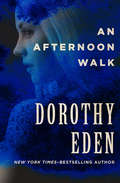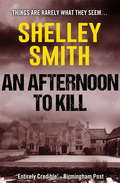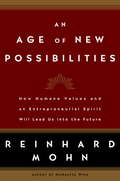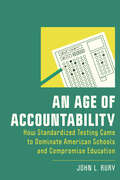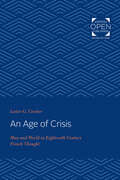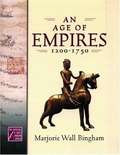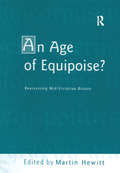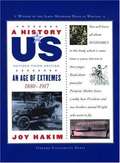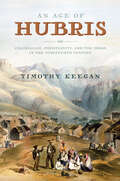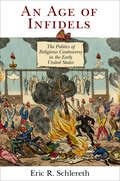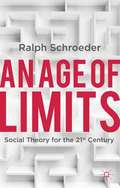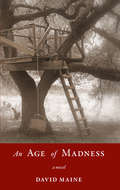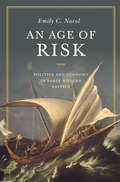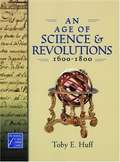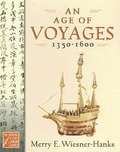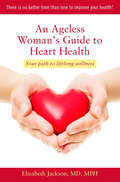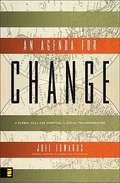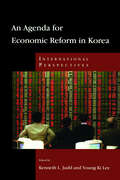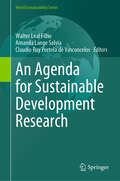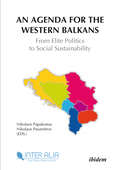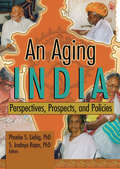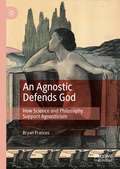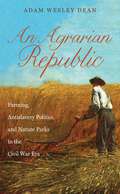- Table View
- List View
An Afternoon Walk
by Dorothy EdenFrom one of the world&’s classic authors of romantic suspense comes an edge-of-your-seat story about a young wife and mother who begins to question her sanity in the wake of mysterious happeningsOn a warm, dreamlike mid-July day, Ella Simpson and her six-year-old daughter, Kitty, come upon an abandoned house. They hear a terrified scream from inside . . . and an owl flies out. That night, Ella can&’t sleep. Has her mind been playing tricks on her ever since her miscarriage, as her husband, Max, insists? Or is there another explanation?Then a woman disappears. Such things aren&’t supposed to happen in their peaceful suburban town. And Ella can&’t shake the feeling that she&’s being watched. When she starts getting anonymous calls, she wonders if she really islosing her grip on reality. Her next-door neighbor Booth Bramwell is the only one who believes she isn&’t going mad. But it isn&’t until her daughter vanishes that Ella starts putting the pieces together.
An Afternoon to Kill
by Shelley SmithThis Victorian mystery with twists and turns will keep you gripped until the very last page: “Prim and petticoated and poisonous” (Kirkus Reviews, starred review). Lancelot Jones was on his way to his first job—as tutor to an Indian Rajah’s son. But the Rajah’s ancient plane and incompetent pilot dropped him in the middle of a desert. The wrong desert, at that. Seeking shade, he finds the only dwelling of any size within miles and its curious owner, an old Englishwoman named Alva Hine. Taking him into her home, Alva begins to tell Lancelot an incredible tale. She tells him a strange story of a summer fifty years ago, of love and hate and murder in a respectable middle-class Victorian household . . . And as the afternoon wears on, Alva’s story begins to take on an increasingly sinister note for the weary Mr. Jones. Soon, he has more than one reason to want to hear the end of the story . . . “[An] amazing novel . . . I am completely under the spell of this fine writer.” —Pretty Sinister Books “Entirely credible.” —Birmingham Post
An Age Of New Possibilities
by Reinhard MohnWe live in an exciting and rapidly changing time—every day it seems new inventions and innovations that change our way of life arrive on the scene. But while our day-to-day lives have become easier, the larger picture is now more complicated. Businesses are also faced with this quandary. Change is occurring in the economic sphere as quickly and often as it is in our individual lives, and the new global economy is presenting even more challenges to companies that must operate in an often unfamiliar worldwide arena. As a result, the modern business world is in dire need of a complete overhaul if companies are to adapt to an environment that is far different from the one in which they initially achieved success. Enter Reinhard Mohn, the innovative entrepreneur who built Bertelsmann into a global powerhouse. Drawing on his more than fifty years of experience in the private sector, Mohn explains how entrepreneurial leaders have a unique ability to lead businesses into the future by adapting to new socioeconomic realities. He shows how private businesses have become increasingly connected to both politics and the public sector, making the need for constant change necessary to the survival and success of all companies. Furthermore, Mohn demonstrates why, in order to thrive in the future, businesses—as well as governmental and social organizations—must abandon the obsolete practices they have long relied on, creating instead new ways of doing business to adapt to our ever more mutable world. With a career’s worth of knowledge gained by guiding Bertelsmann to become one of the foremost media companies in the world, Mohn offers invaluable insights in An Age of New Possibilities, making this an essential read for anyone with a taste for the incredible challenge of doing business in the twenty-first century.
An Age of Accountability: How Standardized Testing Came to Dominate American Schools and Compromise Education (New Directions in the History of Education)
by John L. RuryAn Age of Accountability highlights the role of test-based accountability as a policy framework in American education from 1970 to 2020. For more than half a century, the quest to hold schools and educators accountable for academic achievement has relied almost exclusively on standardized assessment. The theory of change embedded in almost all test-based accountability programs held that assessment with stipulated consequences could lead to major improvements in schools. This was accomplished politically by proclaiming lofty goals of attaining universal proficiency and closing achievement gaps, which repeatedly failed to materialize. But even after very clear disappointments, no other policy framework has emerged to challenge its hegemony. The American public today has little confidence in institutions to improve the quality of goods and services they provide, especially in the public sector. As a consequence, many Americans continue to believe that accountability remains a vital necessity, even if educators and policy scholars disagree.
An Age of Crisis: Man and World in Eighteenth Century French Thought (Goucher Colloquium)
by Lester G. CrockerOriginally published in 1959. This book examines the French Enlightenment by analyzing critical thought in eighteenth-centruy France. It examines the philosophes' views on evil, free will and determinism, and human nature. This is an interesting group to look at, according to Crocker, because French Enlightenment thinkers straddled two vastly different time periods.
An Age of Empires, 1200-1750 (The Medieval and Early Modern World #4)
by Marjorie Wall BinghamThe Age of Empires includes some of the most colorful, ruthless, and restless figures in all of history. During this time Genghis Khan told his troops to "fall upon the enemy like falcons," Ivan the Terrible expelled Mongol invaders from Russia but murdered his own son in a fit of rage, and Babur the Tiger ruled India, combining ferocity on the battlefield with a love of books and poetry.
An Age of Equipoise? Reassessing mid-Victorian Britain
by Martin HewittThe Age of Equipoise by W.L Burn was published in 1964 and became a central text in the canon of interpretations of the Victorian period. The book subsequently fell out of favour but recent claims to establish a new interpretative standard have, paradoxically, prompted reviewers to cast back to Burn's work as the orthodox standard against which such claims should be judged. The essays in this volume by British and American contributors all engage, to varying degrees, with the notion of 'equipoise' and how it can help to illuminate the mid-Victorian period in ways which alternative formulations cannot. Some of the chapters develop arguments embedded in Burn's own book; others take up issues largely absent in The Age of Equipoise, such as the position of children, Britain's interaction with the wider world, and the threats the period experienced to its concept of masculine identity. Together the essays demonstrate the intricacy and turbulence of the forces of cohesion in Victorian society, along with the success of that culture in achieving a working, if shifting, modus vivendi. Moreover, they substantiate the argument that, whatever the limitations of Burn's work, 'equipoise' deserves rehabilitation as a powerful conceptual framework for making sense of mid-Victorian Britain. About the Editor: Martin Hewitt is Director of the Leeds Centre for Victorian Studies and editor of the Journal of Victorian Culture. With Robert Poole he has recently produced an edition of The Diaries of Samuel Bamford, 1858-61 (Sutton, 2000).
An Age of Extremes (A History of Us #8)
by Joy HakimFor the captains of industry men like Andrew Carnegie, John D. Rockefeller, J. P. Morgan, and Henry Ford, the Gilded Age was a time of big money. Technology boomed with the invention of trains, telephones, electric lights, harvesters, vacuum cleaners, and more. But for millions of immigrant workers, it was a time of big struggles, with adults and children alike working 12 to 14 hours a day under extreme, dangerous conditions. The disparity between the rich and the poor was dismaying, which prompted some people to action. In An Age of Extremes, you'll meet Mother Jones, Ida Tarbell, Big Bill Haywood, Sam Gompers, and other movers and shakers, and get swept up in the enthusiasm of Teddy Roosevelt. You'll also watch the United States take its greatest role on the world stage since the Revolution, as it enters the bloody battlefields of Europe in World War I. [This text is listed as an example that meets Common Core Standards in English language arts in grades 4-5 at http://www.corestandards.org.]
An Age of Hubris: Colonialism, Christianity, and the Xhosa in the Nineteenth Century (Reconsiderations in Southern African History)
by Timothy KeeganAn Age of Hubris is the first comprehensive overview of the impact of missionary enterprise on the Xhosa chiefdoms of South Africa in the first half of the nineteenth century, chronicling a world punctuated by war and millenarian eruptions, and the steady encroachment of settler land hunger and colonial hegemony. With it, Timothy Keegan contributes new approaches to Xhosa history and, most important, a new dimension to the much-trodden but still vital topic of the impact—cultural, social, and political—of missionary activity among African peoples.The most significant historical works on the Xhosa have either become dated, foreground imperial-colonial history, or remain heavily theoretical in nature. In contrast, Keegan draws fruitfully on the rich Africanist comparative and anthropological literature now available, as well as extant primary sources, to foreground the Xhosa themselves in this crucial work. In so doing, he highlights the ways in which Africans utilized new ideas, resources, and practices to make sense of, react to, and resist the forces of colonial dispossession confronting them, emphasizing missionary frustration and African agency.
An Age of Infidels
by Eric R. SchlerethHistorian Eric R. Schlereth places religious conflict at the center of early American political culture. He shows ordinary Americans--both faithful believers and Christianity's staunchest critics--struggling with questions about the meaning of tolerance and the limits of religious freedom. In doing so, he casts new light on the ways Americans reconciled their varied religious beliefs with political change at a formative moment in the nation's cultural life.After the American Revolution, citizens of the new nation felt no guarantee that they would avoid the mire of religious and political conflict that had gripped much of Europe for three centuries. Debates thus erupted in the new United States about how or even if long-standing religious beliefs, institutions, and traditions could be accommodated within a new republican political order that encouraged suspicion of inherited traditions. Public life in the period included contentious arguments over the best way to ensure a compatible relationship between diverse religious beliefs and the nation's recent political developments.In the process, religion and politics in the early United States were remade to fit each other. From the 1770s onward, Americans created a political rather than legal boundary between acceptable and unacceptable religious expression, one defined in reference to infidelity. Conflicts occurred most commonly between deists and their opponents who perceived deists' anti-Christian opinions as increasingly influential in American culture and politics. Exploring these controversies, Schlereth explains how Americans navigated questions of religious truth and difference in an age of emerging religious liberty.
An Age of Limits: Social Theory for the 21st Century
by Ralph SchroederAn Age of Limits outlines a new social theory for understanding contemporary society. Providing an analysis of why political, economic and cultural powers face constraints across the global North and beyond, this bold book argues that forces which address current challenges must confront the limits of the interplay between dominant institutions.
An Age of Madness: A Novel
by David MaineA Boston psychiatrist must confront her own inner demons in a novel that “peels away the layers of what can be known and what can be admitted” (Stuart Archer Cohen, author of The Army of the Republic).Dr. Regina Moss is a dedicated healer with a reputation that inspires colleagues and patients alike. Yet Regina is haunted by her past. Her daughter barely speaks to her. And she can’t stop thinking about the lanky new tech on the ward.Grief and trauma simmer just beneath Regina’s brash attitude and biting wit. But as her armor begins to crack, the reader is drawn deep into her troubled psyche. Full of startling revelations and heartrending twists, An Age of Madness is “a confidently rendered portrait of one woman’s journey to recover from loss” (Foreword Reviews).
An Age of Neutrals
by Maartje AbbenhuisAn Age of Neutrals provides a pioneering history of neutrality in Europe and the wider world between the Congress of Vienna and the outbreak of the First World War. The 'long' nineteenth century (1815–1914) was an era of unprecedented industrialization, imperialism and globalization; one which witnessed Europe's economic and political hegemony across the world. Dr Maartje Abbenhuis explores the ways in which neutrality reinforced these interconnected developments. She argues that a passive conception of neutrality has thus far prevented historians from understanding the high regard with which neutrality, as a tool of diplomacy and statecraft and as a popular ideal with numerous applications, was held. This compelling new history exposes neutrality as a vibrant and essential part of the nineteenth-century international system; a powerful instrument used by great and small powers to solve disputes, stabilize international relations and promote a variety of interests within and outside the continent.
An Age of Risk: Politics and Economy in Early Modern Britain
by Emily NacolIn An Age of Risk, Emily Nacol shows that risk, now treated as a permanent feature of our lives, did not always govern understandings of the future. Focusing on the epistemological, political, and economic writings of Thomas Hobbes, John Locke, David Hume, and Adam Smith, Nacol explains that in seventeenth- and eighteenth-century Britain, political and economic thinkers reimagined the future as a terrain of risk, characterized by probabilistic calculation, prediction, and control. In these early modern sources, Nacol contends, we see three crucial developments in thought on risk and politics. While early modern thinkers differentiated uncertainty about the future from probabilistic calculations of risk, they remained attentive to the ways uncertainty and risk remained in a conceptual tangle, a problem that constrained good decision making. They developed sophisticated theories of trust and credit as crucial background conditions for prudent risk-taking, and offered complex depictions of the relationships and behaviors that would make risk-taking more palatable. They also developed two narratives that persist in subsequent accounts of risk--risk as a threat to security, and risk as an opportunity for profit. Looking at how these narratives are entwined in early modern thought, Nacol locates the origins of our own ambivalence about risk-taking. By the end of the eighteenth century, she argues, a new type of political actor would emerge from this ambivalence, one who approached risk with fear rather than hope.By placing a fresh lens on early modern writing, An Age of Risk demonstrates how new and evolving orientations toward risk influenced approaches to politics and commerce that continue to this day.
An Age of Science and Revolutions, 1600-1800 (The Medieval and Early Modern World #6)
by Toby E. HuffAn Age of Science and Revolutions, 1600-1800, tells the colorful story of a pivotal period in human history, an era that is crucial to understanding our own times. The expansion of trade and city life, the spread and reform of religious institutions, the rise of regional empires and local feudal regimes, and revolutionary advances in science and technology laid the foundation for the modern world. Told through the words and experiences of the people who lived it- kings, queens, and commoners, priests and lay people, explorers, scientists, artists, and world travelers- this is a world history for a new generation.
An Age of Voyages, 1350-1600 (The Medieval and Early Modern World #5)
by Merry E. Wiesner-HanksCultural life flowered from the mid-fifteenth century in the Italian city-states, many of which profited from the new trading opportunities that growing world networks permitted. Contact among regions of the world expanded, bringing new ideas and prompting an appreciation of arts and letters--not only of the present but of the past. In Italy this cultural flowering was known at first as the renaissance of arts and letters, soon shortened to just "Renaissance" to accommodate cultural ingredients that came from beyond Europe. Italian and northern European cultural expansion benefited from similar retrieval of ancient knowledge in the Islamic world and East Asia. Like the Italians, the Chinese had grown even wealthier from the extensive links to global commerce provided by the Mongol Empire, but once thrown off, their cultural life flourished under the Ming. Cultural knowledge and the arts spread across Asia and into Europe. As part of state-building, the Ming nourished commerce but also rejected the cosmopolitan Buddhist legacy that arrived from central and south Asia. To strengthen dynastic Chinese rule, the Ming challenged Buddhism with a revival of age-old concern for the Confucian values that had languished under the Mongols. Foremost among these new Confucians was Wu Yube, so expert in his teachings that he attracted a wide coterie of disciples. In India, Nanak, an educated employee of an Afghan prince, sparked the founding of Sikhism. A similar search for reviving fundamental religious values occurred in Europe, where Martin Luther challenged the practices of the Catholic church, ushering in Protestantism. Religious reform and resistance to it were closely connected to the state-building efforts of enterprising monarchs such as Henry VIII of England. India likewise experienced a fervent movement to revive pure, ancient religious practices. Fourteenth and fifteenth century global trade and long-distance ventures such as those made by the Ming and then by the Portuguese further inspired and advanced these worldwide cultural and political developments. A brisk Indian Ocean trade flourished. Economic change ensued with the arrival of New World silver on the global market. The advance of printing not only furthered the cause of religious reform and state-building globally; it also helped globalize knowledge and intellectual experimentation. People of great power and those of more limited means came to live their lives differently because of this expanding web of shared knowledge and trade. Cities flourished, the enslavement of native Americans came to replace their use as human sacrifices, and diseases migrated at a more rapid pace and greater devastation than perhaps ever before.
An Ageless Woman's Guide to Heart Health
by Elizabeth JacksonHeart disease has long been thought of as a men's issue, when it is actually the leading cause of death in both men and women. In fact, since 1984, more American women than men have died of heart disease. Are you surprised?.Often at the helm of their family's overall health, diet, and nutrition, a woman and her lifestyle decisions can affect not only her own wellbeing; they can determine the habits of her partner and children as well. By becoming better educated, a woman can have a profound, permanent impact on the health of the people around her..An Ageless Woman's Guide to Heart Health is every woman's guidebook to enjoying a heart-healthy life. Renowned cardiologist Dr. Lisa Jackson shares tips and resources to help you make positive steps toward improving your health. Whether you're younger or older, fit or ailing, it's never too late to make changes in your life that can lead you-and those you love-to a healthier heart.
An Ageless Woman's Guide to Heart Health
by Elizabeth JacksonHeart disease has long been thought of as a men's issue, when it is actually the leading cause of death in both men and women. In fact, since 1984, more American women than men have died of heart disease. Are you surprised?.Often at the helm of their family's overall health, diet, and nutrition, a woman and her lifestyle decisions can affect not only her own wellbeing; they can determine the habits of her partner and children as well. By becoming better educated, a woman can have a profound, permanent impact on the health of the people around her..An Ageless Woman's Guide to Heart Health is every woman's guidebook to enjoying a heart-healthy life. Renowned cardiologist Dr. Lisa Jackson shares tips and resources to help you make positive steps toward improving your health. Whether you're younger or older, fit or ailing, it's never too late to make changes in your life that can lead you-and those you love-to a healthier heart.
An Agenda for Change
by Joel EdwardsThis is a compelling tract for our times (manifesto) addressed to evangelicals around the English-speaking world from the general director of the Evangelical Alliance. This umbrella group represents evangelical Christians in the United Kingdom and is part of the larger World Evangelical Alliance of 128 national and seven regional alliances including the National Association of Evangelicals in the USA. ?Written in an accessible style this short and readable manifesto issues a prophetic call to help set the agenda for evangelicals to: -Present Christ credibly the 21st century -Rehabilitate term "evangelical" as good news -Engage in spiritual and social transformation The book includes discussion questions to enable classes, groups, and teams to read and discuss the contents of the book. As the church faces challenges and opportunities, this book can serve as a catalyst to move the evangelical church forward to make a difference in the world by fostering spiritual and social transformation.
An Agenda for Economic Reform in Korea: International Perspectives
by Kenneth Judd Young-Ki LeeAn Agenda for Economic Reform in Korea looks at Korea's economic problems from the perspective of the American experience with economic reforms and sheds new light on the problems of economic reform facing nations all over the world. The authors examine such issues as corporate governance, social welfare, labor relations, and other pressing challenges—and suggest a new vision for the Korean economy.
An Agenda for Sustainable Development Research (World Sustainability Series)
by Walter Leal Filho Amanda Lange Salvia Claudio Ruy Portela de VasconcelosThis book involves establishing a set of priorities and a roadmap that can guide scholarly and practical efforts towards sustainability goals. It encourages collaboration across disciplines to address complex sustainability issues that span social, economic, and environmental domains. It also supports the development of robust methodologies for conducting research, including quantitative, qualitative, and mixed methods approaches. But despite the importance of and the need for an agenda for sustainable development research, many efforts are isolated and thematically disconnected. Also, it is difficult to find information on how sustainability research is being undertaken and on the wide range of methods being used. Against this backdrop and in order to facilitate a broad discussion on the contribution of sustainable development research, this book is being produced. The book gathers inputs from universities and research organisations working on matters related to sustainable development research in a variety of contexts. It also provides a platform for the dissemination of information on the latest initiatives, paving the way for technology transfer and networking. Furthermore, the book intends to provide a fertile basis upon which universities, research centres, and practitioners may cooperate more closely in this key area. Last but not least, a further aim of the book is to present methodological approaches and experiences deriving from case studies and projects, which aim to show how sustainability research may be implementing across a range of disciplines. Thanks to its scope and interdisciplinarity, this books makes an excellent reading to everyone interested on sustainability research.
An Agenda for the Western Balkans: From Elite Politics to Social Sustainability
by Nikolaos Papakostas Nikolaos PasamitrosThe Western Balkan countries have been both a popular subject matter for diachronic analysis and a 1990s favorite. The significant changes that followed the most recent times of conflict in the region mostly evolve around the process of Europeanization. Despite the plethora of analyses, most approaches to the Western Balkans suffer from theoretical stagnancy, ex parte political practice, and detachment of politics from societal needs. This volume is the work of a team of theorists and practitioners who attempt a multidisciplinary approach to Western Balkans reality. <P><P>An Agenda for the Western Balkans offers a critical view on issues that have been over-analyzed in mainstream terms and opens a discussion that will occupy researchers and practitioners for years to come. It addresses novel topics and engages in innovative approaches that cut across disciplines of social sciences (political science, international relations, sociology, historiography, geography, political economy) and levels of analysis (local, national, regional, European, global). This collection is a pioneer theoretical and practical guide towards a sustainable future for the Western Balkans.
An Aging India: Perspectives, Prospects, and Policies
by S. Irudaya Rajan Phoebe S LiebigExplore Indian policy and practice on aging from a variety of perspectives! This pathbreaking collection provides something that has been missing in the literature on aging in India, especially for non-Indian audiences: studies of various aspects of aging in India combined with analyses of current policies, policy trends and recommendations. You'll examine aging issues from a variety of perspectives-demographic foundations, social and family relations, economics, health and disability, current interventions, and advocacy and policy. An Aging India also provides you with up-to-date references, explanations of differences and similarities within India's diverse population, examples of programs in various settings including a geriatric hospital, a major NGO, and old-age homes, and an overview of the development of India's national policy on aging. Where appropriate, comparisons with U.S. policy approaches are noted. An Aging India: Perspectives, Prospects, and Policies examines: the demography of aging in India the current state of research on aging, and the pitfalls associated with that research income, poverty, and the problems created by the lack of any widespread retirement income system in India the health status of Indian elders and what their healthcare prospects are the situation for the disabled elderly in India elder abuse in the Indian context social networks and grassroots organizations for seniors in India the role of Indian geriatric hospitals and old-age homes The insights of the top researchers and practitioners who contributed to An Aging India: Perspectives, Prospects, and Policies will strike home with their counterparts around the world. Make this book a part of your professional/teaching collection today!
An Agnostic Defends God: How Science and Philosophy Support Agnosticism
by Bryan FrancesThis book contains a unique perspective: that of a scientifically and philosophically educated agnostic who thinks there is impressive—if maddeningly hidden—evidence for the existence of God. Science and philosophy may have revealed the poverty of the familiar sources of evidence, but they generate their own partial defense of theism. Bryan Frances, a philosopher with a graduate degree in physics, judges the standard evidence for God’s existence to be awful. And yet, like many others with similar scientific and philosophical backgrounds, he argues that the usual reasons for atheism, such as the existence of suffering and success of science, are weak. In this book you will learn why so many people with scientific and philosophical credentials are agnostics (rather than atheists) despite judging all the usual evidence for theism to be fatally flawed.
An Agrarian Republic
by Adam Wesley DeanThe familiar story of the Civil War tells of a predominately agricultural South pitted against a rapidly industrializing North. However, Adam Wesley Dean argues that the Republican Party's political ideology was fundamentally agrarian. Believing that small farms owned by families for generations led to a model society, Republicans supported a northern agricultural ideal in opposition to southern plantation agriculture, which destroyed the land's productivity, required constant western expansion, and produced an elite landed gentry hostile to the Union. Dean shows how agrarian republicanism shaped the debate over slavery's expansion, spurred the creation of the Department of Agriculture and the passage of the Homestead Act, and laid the foundation for the development of the earliest nature parks.Spanning the long nineteenth century, Dean's study analyzes the changing debate over land development as it transitioned from focusing on the creation of a virtuous and orderly citizenry to being seen primarily as a "civilizing" mission. By showing Republicans as men and women with backgrounds in small farming, Dean unveils new connections between seemingly separate historical events, linking this era's views of natural and manmade environments with interpretations of slavery and land policy.
